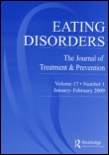
Eating Disorders
Scope & Guideline
Exploring diverse perspectives in the realm of eating disorders.
Introduction
Aims and Scopes
- Prevention and early intervention strategies:
The journal emphasizes research on preventative measures and early identification of eating disorders, particularly in vulnerable populations such as adolescents and marginalized communities. - Comorbidity and psychological factors:
There is a strong focus on the interplay between eating disorders and other psychological conditions, such as anxiety, PTSD, and depression, exploring how these comorbidities influence treatment outcomes and patient experiences. - Diverse populations and inclusivity:
The journal prioritizes studies that address eating disorders across various demographics, including gender, sexual orientation, and cultural backgrounds, highlighting unique experiences and treatment needs. - Innovative treatment approaches:
Research on novel therapeutic interventions, including cognitive-behavioral therapy, telehealth, and integrative models incorporating mindfulness and body image work, is a core focus, aiming to enhance treatment efficacy. - Impact of societal factors and media:
The journal investigates the role of societal influences, including media representation, body image ideals, and socioeconomic factors, on the onset and perpetuation of eating disorders. - Longitudinal and developmental studies:
Research examining the developmental trajectories of eating disorders, including risk factors and long-term outcomes, is emphasized to better understand the evolution of these disorders over time.
Trending and Emerging
- Intersectionality in eating disorders research:
A growing trend focuses on the intersection of race, gender identity, and socioeconomic status in relation to eating disorders, highlighting the need for tailored interventions that consider diverse experiences. - Digital and social media influences:
Research examining the impact of social media and digital platforms on body image and eating behaviors is on the rise, reflecting societal changes and the increasing relevance of online environments in shaping perceptions of health and beauty. - Telehealth and virtual interventions:
The recent emphasis on telehealth solutions for eating disorder treatment has surged, particularly in response to the COVID-19 pandemic, showcasing innovative approaches to accessibility and patient engagement. - Focus on male eating disorders:
There is an increasing recognition of eating disorders in male populations, with research expanding to explore unique challenges and treatment needs of men and boys, countering longstanding stereotypes that these disorders predominantly affect women. - Mental health and trauma-informed care:
Emerging themes related to trauma-informed care and the psychological underpinnings of eating disorders are gaining traction, emphasizing the importance of understanding trauma history in treatment planning. - Community-based and participatory research:
There is a rising interest in community-engaged research methodologies that involve stakeholders in the research process, aiming to create more relevant and impactful interventions for diverse populations.
Declining or Waning
- Traditional gender stereotypes in eating disorders:
There is a noticeable reduction in studies focused solely on traditional gender differences in eating disorders, indicating a broader focus on inclusivity and intersectionality that transcends binary gender norms. - Focus on singular treatment modalities:
Research centered on specific treatment modalities without consideration of integrative or holistic approaches seems to be decreasing, as the field moves toward more comprehensive treatment frameworks. - Stigmatization narratives:
Papers solely focused on the stigmatization of eating disorders without exploring solutions or interventions are becoming less frequent, reflecting a shift towards more constructive discourse. - Historical perspectives on eating disorders:
The journal appears to be moving away from historical analyses of eating disorder trends, prioritizing contemporary issues and current research methodologies instead. - Quantitative studies without qualitative insights:
There is a decline in purely quantitative studies that do not incorporate qualitative perspectives, as the field increasingly values mixed-method approaches that capture the complexity of lived experiences.
Similar Journals
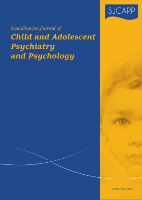
Scandinavian Journal of Child and Adolescent Psychiatry and Psychology
Advancing mental health research for youth.The Scandinavian Journal of Child and Adolescent Psychiatry and Psychology is a premier platform for disseminating significant research in the fields of child and adolescent mental health. Published by SCIENDO, this journal has embraced an Open Access model since 2013, promoting wider accessibility to vital findings and discussions in this pivotal area of study. With a unique focus on issues facing young individuals, it aims to bridge gaps between research, clinical practice, and policy-making. The journal invites submissions from researchers, clinicians, and practitioners worldwide, ensuring a diverse range of perspectives and contributions. By fostering scholarly dialogue and innovation, it plays an essential role in advancing knowledge and improving outcomes in child and adolescent psychiatry and psychology, making it a crucial resource for anyone invested in the mental well-being of young populations.
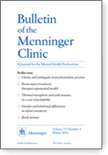
BULLETIN OF THE MENNINGER CLINIC
Fostering interdisciplinary dialogue in clinical psychology.The BULLETIN OF THE MENNINGER CLINIC, an esteemed publication of GUILFORD PUBLICATIONS INC, has been a pivotal resource in the fields of Clinical Psychology and Psychiatry since its inception in 1945. With ISSN 0025-9284 and E-ISSN 1943-2828, this journal is recognized for its commitment to advancing knowledge and practices in mental health. Indexed in Scopus with respectable rankings across various categories, it stands in the Q3 quartile for both Clinical Psychology and Psychiatry and Mental Health, indicating its role as a significant contributor to academic discourse. Although it operates under a subscription model, the journal features a broad spectrum of peer-reviewed articles, case studies, and research findings that are essential for professionals, researchers, and students dedicated to understanding and improving mental health care. The BULLETIN OF THE MENNINGER CLINIC serves as a vital platform for interdisciplinary dialogue, fostering innovative approaches and methodologies that shape the future of mental health treatment and research.
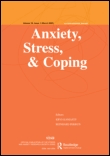
ANXIETY STRESS AND COPING
Pioneering Research on Mental Health ChallengesANXIETY, STRESS & COPING, published by Taylor & Francis Ltd, is a premier academic journal dedicated to advancing the understanding of anxiety, stress, and coping mechanisms across various contexts. With an impact factor that reflects its relevance and influence, this journal is a key resource for professionals and researchers in the fields of clinical psychology, psychiatry, developmental and educational psychology, and related disciplines. The journal is classified in the Q1 category across multiple sectors, testifying to its high standards and rigorous peer-review process. Covering comprehensive studies and innovative research from 1992 to 2024, ANXIETY, STRESS & COPING offers invaluable insights, making it essential for those exploring the complexities of mental health and human behavior. Although it does not operate under an open access model, subscribers gain exclusive access to cutting-edge findings and methodologies that shape current practices and interventions in psychological health.

Eating and Weight Disorders-Studies on Anorexia Bulimia and Obesity
Transforming Perspectives on Eating Disorders and Weight IssuesEating and Weight Disorders-Studies on Anorexia Bulimia and Obesity, published by SPRINGER, is a pivotal journal in the fields of Clinical Psychology and Psychiatry that addresses the multifaceted issues surrounding eating disorders, including anorexia, bulimia, and obesity. With an impressive impact factor reflecting its commitment to quality research, this journal is ranked in the Q2 quartile for both Clinical Psychology and Psychiatry and Mental Health. The journal has transitioned to an Open Access model as of 2023, broadening its reach and facilitating greater access to vital research findings in the areas of eating behaviors and weight management. Operating from its base in Switzerland, Eating and Weight Disorders serves as an essential resource for researchers, clinicians, and students alike, presenting high-quality empirical studies, reviews, and case reports that contribute significantly to the understanding of these complex conditions. With a rich publication history dating back to 1998, the journal continues to maintain its relevance in the ongoing discourse surrounding mental health and weight issues on a global scale.
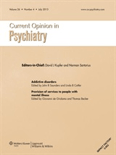
CURRENT OPINION IN PSYCHIATRY
Fostering Knowledge for Mental Health ProfessionalsCurrent Opinion in Psychiatry is a premier journal published by Lippincott Williams & Wilkins, dedicated to the dynamic and evolving field of psychiatry and mental health. With a commendable impact factor and ranking 30th out of 567 in the Scopus database, this journal occupies a Q1 quartile position, reflecting its significance and influence within the academic community. Since its inception in 1988, Current Opinion in Psychiatry has aimed to provide critical reviews, leading research, and expert opinions that shape clinical practice and decision-making in psychiatry. While the journal is not open access, it continues to serve as an essential resource for researchers, clinicians, and students seeking insights into contemporary psychiatric challenges and advancements. With its ongoing commitment to high-quality content, the journal remains a vital platform for knowledge dissemination and dialog in the field.
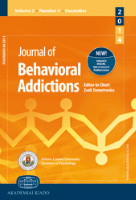
Journal of Behavioral Addictions
Championing Open Access to Addiction Research InsightsJournal of Behavioral Addictions is a premier academic platform dedicated to exploring the multifaceted phenomena of behavioral addictions, including but not limited to gaming, internet, and gambling behaviors. Published by AKADEMIAI KIADO ZRT, this open-access journal has been a vital resource since its inception in 2012, enabling widespread dissemination of vital research findings. With an impressive impact reflected in its Q1 rankings in Clinical Psychology, Medicine (Miscellaneous), and Psychiatry and Mental Health, the journal is recognized as an authoritative source in its field, ranked #10 out of 311 in Clinical Psychology and #29 out of 567 in Psychiatry and Mental Health, placing it in the top percentiles for both disciplines. As a significant contributor to the academic community, the journal's overarching objective is to provide insight and advance understanding of behavioral addiction, fostering dialogue among researchers, clinicians, and practitioners. Whether you are a researcher delving into these critical issues or a student eager to engage with cutting-edge studies, the Journal of Behavioral Addictions serves as an indispensable resource on the psychological and medical implications of addiction behaviors.
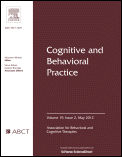
COGNITIVE AND BEHAVIORAL PRACTICE
Elevating psychological understanding with rigorous scholarship.COGNITIVE AND BEHAVIORAL PRACTICE, published by Elsevier Science Inc, is a prominent peer-reviewed journal focusing on the rapidly evolving field of clinical psychology. With an ISSN of 1077-7229 and an E-ISSN of 1878-187X, this journal has established itself as a key resource for researchers and practitioners alike since its inception in 1994. As of 2023, it proudly holds a Q1 ranking in the Clinical Psychology category, ranked #85 out of 311 according to Scopus, placing it in the 72nd percentile among its peers. The journal aims to disseminate innovative approaches and evidence-based practices within cognitive and behavioral therapy, encouraging robust discussion and dissemination of new findings to enhance clinical practices. Researchers and students engaged in psychological research will find the substantial rigor and depth in its publications invaluable for advancing their knowledge and skills.

BRITISH JOURNAL OF CLINICAL PSYCHOLOGY
Pioneering Insights in Clinical PsychologyWelcome to the British Journal of Clinical Psychology, a leading publication in the field of psychology, particularly recognized for its contributions to clinical practice and research since its inception. Published by Wiley, the journal boasts an impressive impact with a Q1 ranking in both Clinical Psychology and Medicine (Miscellaneous) categories as of 2023, evidenced by its placement at rank #65 out of 311 in Scopus for Clinical Psychology, reflecting its impactful and high-quality contributions in the domain. With a history stretching back to 1962 and ongoing publication through 2024, the journal provides a rigorous platform for researchers, professionals, and students to disseminate and engage with innovative studies, methodologies, and clinical insights. Although it does not currently operate under an Open Access model, the journal’s commitment to enhancing knowledge and practice in clinical psychology makes it an indispensable resource for anyone involved in psychological research and practice.
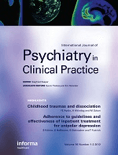
INTERNATIONAL JOURNAL OF PSYCHIATRY IN CLINICAL PRACTICE
Pioneering insights in clinical psychiatry and mental health.INTERNATIONAL JOURNAL OF PSYCHIATRY IN CLINICAL PRACTICE is a distinguished publication in the field of Psychiatry and Mental Health, published by TAYLOR & FRANCIS LTD in the United Kingdom. With an impressive 2023 impact factor that places it in the Q2 category among its peers, this journal is an essential resource for researchers, clinicians, and students dedicated to advancing mental health practices and understanding psychiatric disorders. Covering topics from clinical studies to innovative treatment methodologies, the journal welcomes original research, reviews, and case studies that contribute valuable insights into clinical practice. Accessible without any open access restrictions, the journal has been a pivotal platform since its inception in 1997, facilitating knowledge exchange in the field up to 2024. As evidenced by its notable Scopus ranking within the top 73rd percentile of Psychiatry and Mental Health, it remains committed to impacting clinical practices significantly.

INTERNATIONAL JOURNAL OF EATING DISORDERS
Elevating the conversation around eating disorders with empirical evidence.International Journal of Eating Disorders, published by Wiley, stands as a premier platform for disseminating high-quality research in the field of psychiatry and mental health, particularly focusing on eating disorders. With a respectable impact factor and ranking in the 91st percentile among its peers, this journal is recognized for its rigorous peer-review process and commitment to advancing understanding through empirical evidence. Established in 1981, it has continually evolved, maintaining its status as a Q1 journal in the Scopus category of Psychiatry and Mental Health. The Journal is committed to exploring the multifaceted nature of eating disorders, providing vital insights that support clinicians, researchers, and students alike in their pursuit of knowledge and innovation. Although access is not currently open, the journal offers a wealth of valuable resources for those engaged in cutting-edge research and clinical practice related to eating disorders.